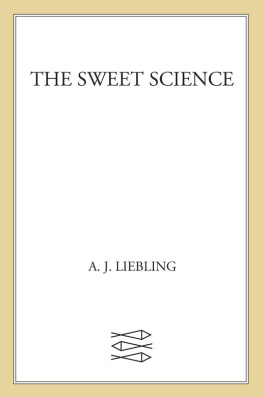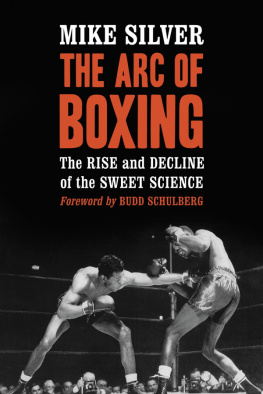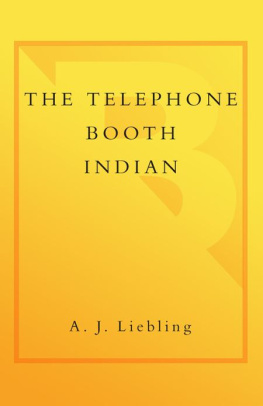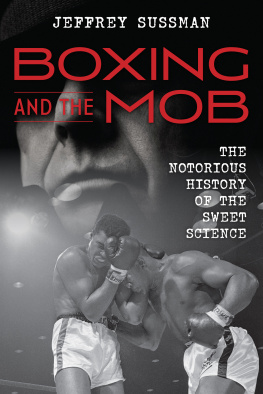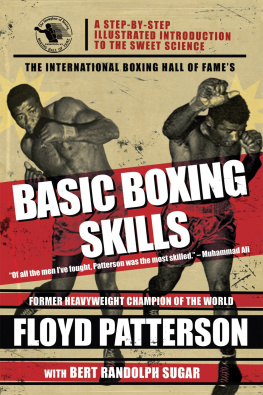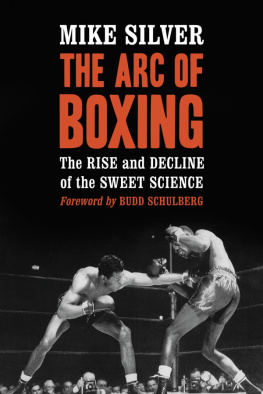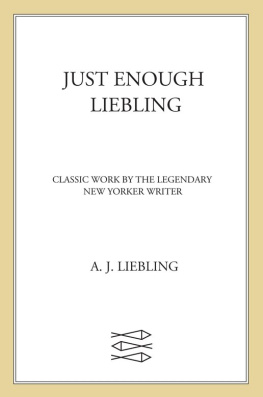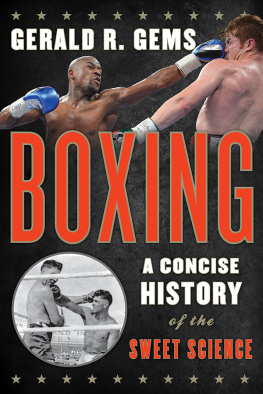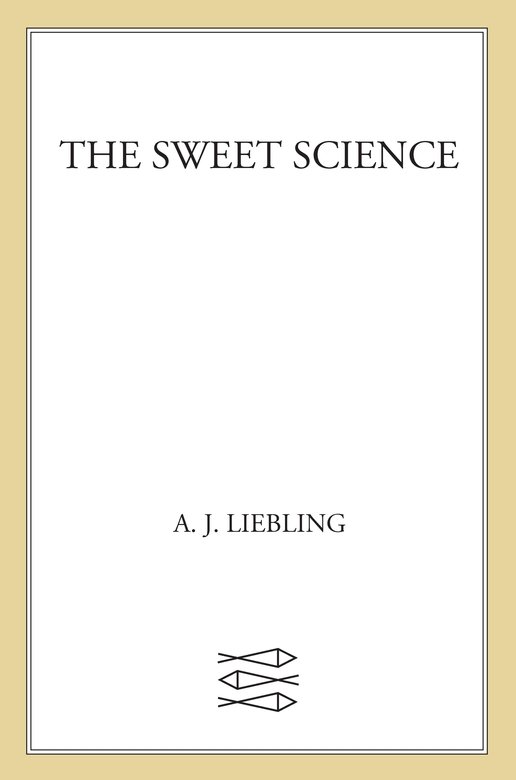They All Sang ( with Edward B. Marks )
Back Where I Came From
The Telephone Booth Indian
The Road Back to Paris
Republic of Science
The Wayward Pressman
Mink and Red Herring
The Honest Rainmaker
Normandy Revisited
The Sweet Science
The Earl of Louisiana
The Press
The Most of A. J. Liebling
Between Meals
Mollie & Other War Pieces
Chicago: Second City
A Neutral Corner
Liebling at The New Yorker
W atching a fight on television has always seemed to me a poor substitute for being there. For one thing, you cant tell the fighters what to do. When I watch a fight, I like to study one boxers problem, solve it, and then communicate my solution vocally. On occasion my advice is disregarded, as when I tell a man to stay away from the other fellows left and he doesnt, but in such cases I assume that he hasnt heard my counsel, or that his opponent has, and has acted on it. Some fighters hear better and are more suggestible than othersfor example, the pre-television Joe Louis. Let him have it, Joe! I would yell whenever I saw him fight, and sooner or later he would let the other fellow have it. Another fighter like that was the late Marcel Cerdan, whom I would coach in his own language, to prevent opposition seconds from picking up our signals. Vas-y, Marcel! I used to shout, and Marcel always y allait. I get a feeling of participation that way that I dont in front of a television screen. I could yell, of course, but I would know that if my suggestion was adopted, it would be by the merest coincidence.
Besides, when you go to a fight, the boxers arent the only ones you want to be heard by. You are surrounded by people whose ignorance of the ring is exceeded only by their unwillingness to face factsthe sharpness of your boxers punching, for instance. Such people may take it upon themselves to disparage theprincipal you are advising. This disparagement is less generally addressed to the man himself (as Gavilan, youre a bum!) than to his opponent, whom they have wrong-headedly picked to win. (Hes a cream puff, Miceli! they may typically cry. He cant hurt you. He cant hurt nobody. Lookslaps! Ha, ha!) They thus get at your manand, by indirection, at you. To put them in their place, you address neither them nor their man but your man. (Get the other eye, Gavilan! you cry.) This throws them off balance, because they havent noticed anything the matter with either eye. Then, before they can think of anything to say, you thunder, Look at that eye! It doesnt much matter whether or not the man has been hit in the eye; he will be. Addressing yourself to the fighter when you want somebody else to hear you is a parliamentary device, like Mr. Chairman Before television, a prize-fight was to a New Yorker the nearest equivalent to the New England town meeting. It taught a man to think on his seat.
Less malignant than rooters for the wrong man, but almost as disquieting, are those who are on the right side but tactically unsound. At a moment when you have steered your boxer to a safe lead on points but can see the other fellow is still dangerous, one of these maniacs will encourage recklessness. Finish the jerk, Harry! he will sing out. Stop holding him up! Dont lose him! But you, knowing the enemy is a puncher, protect your clients interests. Move to your left, Harry! you call. Keep moving! Keep moving! Dont let him set! I sometimes finish a fight like that in a cold sweat.
If you go to a fight with a friend, you can keep up unilateral conversations on two vocal levelsone at the top of your voice, directed at your fighter, and the other a running expertise nominally aimed at your companion but loud enough to reach a modest fifteen feet in each direction. Reminds me of Panama Al Brown, you may say as a new fighter enters the ring. He wasfive feet eleven and weighed a hundred and eighteen pounds. This fellow may be about forty pounds heavier and a couple of inches shorter, but hes got the same kind of neck. I saw Brown box a fellow named Mascart in Paris in 1927. Guy stood up in the top gallery and threw an apple and hit Brown right on the top of the head. The whole house started yelling, Finish him, Mascart! Hes groggy! Then, as the bout begins, Boxes like Al, too, except this fellows a southpaw. If he wins, you say, I told you he reminded me of Al Brown, and if he loses, Well, well, I guess hes no Al Brown. They dont make fighters like Al any more. This identifies you as a man who (a) has been in Paris, (b) has been going to fights for a long time, and (c) therefore enjoys what the fellows who write for quarterlies call a frame of reference.
It may be argued that this doesnt get you anywhere, but it at least constitutes what a man I once met named Thomas S. Matthews called communication. Mr. Matthews, who was the editor of Time, said that the most important thing in journalism is not reporting but communication. What are you going to communicate? I asked him. The most important thing, he said, is the man on one end of the circuit saying My God, Im alive! Youre alive! and the fellow on the other end, receiving his message, saying My God, youre right! Were both alive! I still think it is a hell of a way to run a news magazine, but it is a good reason for going to fights in person. Television, if unchecked, may carry us back to a pre-tribal state of social development, when the family was the largest conversational unit.
Fights are also a great place for adding to your repertory of witty sayings. I shall not forget my adolescent delight when I first heard a fight fan yell, I hope youse bot gets knocked out! I thought he had made it up, although I found out later it was a cliche. It is a formula adaptable to an endless variety of situations outside the ring. The only trouble with it is it neverworks out. The place where I first heard the line was Bill Browns, a fight club in a big shed behind a trolley station in Far Rockaway.
On another night there, the time for the main bout arrived and one of the principals hadnt. The other fighter sat in the ring, a bantamweight with a face like a well-worn coin, and the fans stamped in cadence and whistled and yelled for their money back. It was thirty years before television, but there were only a couple of hundred men on hand. The preliminary fights had been terrible. The little fighter kept looking at his hands, which were resting on his knees in cracked boxing gloves, and every now and then he would spit on the mat and rub the spittle into the canvas with one of his scuffed ring shoes. The longer he waited, the more frequently he spat, and I presumed he was worrying about the money he was supposed to get; it wouldnt be more than fifty dollars with a house that size, even if the other man turned up. He had come there from some remote place like West or East New York, and he may have been thinking about the last train home on the Long Island Railroad, too. Finally, the other bantamweight got there, looking out of breath and flustered. He had lost his way on the railroadchanged to the wrong train at Jamaica and had to go back there and start over. The crowd booed so loud that he looked embarrassed. When the fight began, the fellow who had been waiting walked right into the new boy and knocked him down. He acted impatient. The tardy fellow got up and fought back gamely, but the one who had been waiting nailed him again, and the latecomer just about pulled up to one knee at the count of seven. He had been hit pretty hard, and you could see from his face that he was wondering whether to chuck it. Somebody in the crowd yelled out, Hey, Hickey! You kept us all waiting! Why dont you stay around awhile? So the fellow got up and caught for ten rounds and probably made the one who had come early miss his train. Its another formula with multipleapplications, and I think the man who said it that night in Far Rockaway did make it up.

